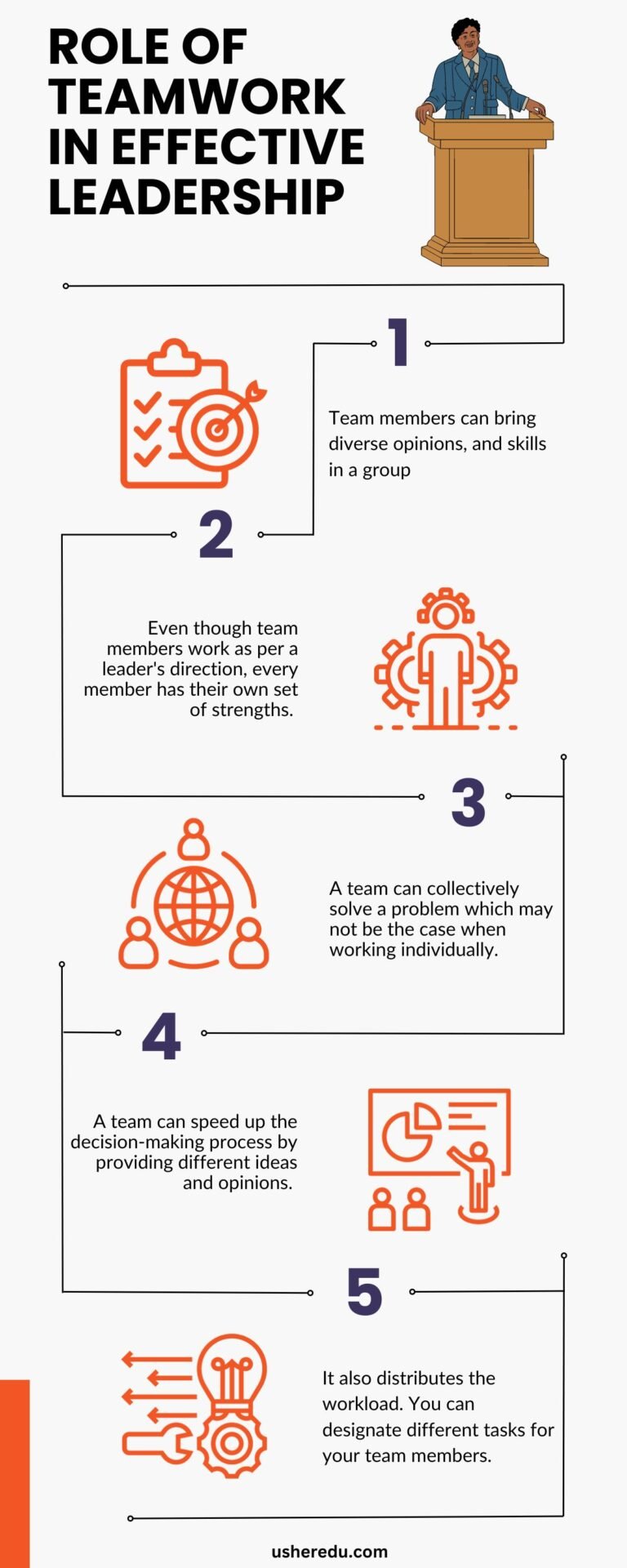Who is a leader?
Have you ever wondered who is a leader? What qualities does a leader possess? And, do you know why you should become a leader?
A leader is a person who directs, guides and manages his team to achieve a common objective. A strong leader could influence the thought process of his team members.
Many people desire to become leaders in their respective fields. However, people with exceptional resilience, adaptability, integrity, and ethics go on to become great leaders.
Why should you become a leader?
To begin with, leadership is equivalent to success. Leaders are achievers. They are known for setting new standards and achieving milestones. A leader encourages, inspires, and pushes people to reach their greatest potential. They establish a common goal, accommodate obstacles, and serve as a roadmap for sustained achievement.
Anyone can become a leader, even you, students!
How to become a leader?
Now, let us have a look at the following leadership qualities that can help you to become an achiever in life:
Good communication skills
A leader always believes in communication with his team members. Being able to clearly convey your ideas and listen actively to others promotes collaboration and ensures that everyone is on the same page.
Strong communication skills inspire and motivate your team, thereby building a positive environment that encourages growth and success.
Observation Ability
A leader must have the ability to observe. Being able to keenly observe and analyze situations allows leaders to identify strengths, weaknesses, and opportunities within their team or organization.
This enables them to make informed decisions and implement strategies that will lead to positive outcomes.
Observation skills also help leaders anticipate potential challenges or conflicts, allowing them to proactively address issues before they escalate.
Good Listening Skills
Leaders who possess strong listening skills are able to truly understand the needs, concerns, and ideas of their team members. This not only builds open communication and trust but also allows leaders to make well-informed decisions that take into account the perspectives of all stakeholders.
A good leader should also be a good listener and understand others’ problems. Team members and people in general always want someone who can resolve issues.
Strategic Planning
Leaders should be good at planning and implementing a given task. By developing a clear vision and setting goals, leaders can create a roadmap for their team to follow.
For example, you are a student leader in your group, and your teacher has given you a group project. Now you must list the tasks, assign them to your team members, and define the deadline of your project. Leaders take the responsibility to get the task completed on time.
Optimistic Approach
Leaders who maintain a positive outlook can inspire and motivate their team members, even in challenging times. By approaching obstacles with optimism, leaders can encourage creative problem-solving and encourage a resilient mindset within their team.
Encouragement from a leader helps his team members to move ahead during challenging times.
Skills and Knowledge
Lastly, a leader should have relevant skills and knowledge to perform a task. Leaders should possess a diverse range of skills, such as communication, problem-solving, and decision-making, to effectively navigate challenges and guide their team toward success.
To enhance your knowledge, you must read books, watch topic-related tutorials, and study real-life cases.
Importance of becoming a student leader
Have you ever noticed your school’s head boy, head girl, or sports captain? What do they have in common?
Why are they always chosen to represent their class or the entire school at prestigious events?
The answer is simple. They achieve goals set by your school. You could either be an all-rounder or specialize in certain subjects.
When you lead a team for the first time, there are chances that you will make mistakes. You must work under stress. Also, your team members could give you a hard time.
However, you will learn many valuable lessons from these challenges. They are:
Team Management
Learning how to effectively lead and motivate a team towards a common goal is crucial in any leadership role. It involves understanding each team member’s strengths and weaknesses, delegating tasks appropriately, and building a positive and collaborative work environment.
You understand that your team members may have completely different perspectives, work styles, and characteristics. You must bring them together and achieve the goals.
Task Completion
The deadline is near and you must submit the work on time.
Being a leader requires the ability to prioritize tasks and ensure their completion in a timely manner. This involves setting clear goals, establishing deadlines, and monitoring progress to ensure that objectives are met.
A student leader must supervise his team members’ task completion speed. Most importantly, you will need this skill in a corporate job.
Personal Growth
Working as a student leader can boost your self-confidence, and provide more clarity on your strengths and weaknesses. It challenges you to step out of your comfort zone, take on new responsibilities, and continuously improve your skills and abilities.
It provides opportunities for self-reflection and self-awareness, as you navigate through various challenges and learn from both successes and failures. This personal growth not only benefits you as a leader but also positively impacts your relationships, career prospects, and overall life satisfaction.
Build a strong network
Having a diverse and supportive network can provide valuable resources, advice, and growth opportunities. It allows leaders to tap into different perspectives, gain new insights, and establish mutually beneficial relationships.
Academic projects can help you to build a strong team. You will get a chance to interact with your peers, subject experts, and professionals. This can open many new horizons like mentorship opportunities, build valuable connections, and get a broader perspective on different issues.
Community engagement
As a leader, you will have the opportunity to engage with the community and make a positive impact. This can involve building relationships with stakeholders, addressing community needs, and promoting social responsibility.
It allows you to create a sense of belonging and trust within the community, which can greatly benefit your team or organization in the long run.
To create a welcoming and supportive campus community, student leaders frequently play a critical role.
They can aid in creating a nurturing atmosphere that promotes education, teamwork, and individual well-being.
Skill Development
Student leadership offers a platform to hone a diverse set of skills such as communication, teamwork, time management, and decision-making, essential for future professional and personal endeavors.
Empowerment and Influence
Student leaders have the opportunity to effect positive change in their communities or institutions. They can advocate for causes, initiate projects, and inspire others to contribute to meaningful initiatives.
Learning from Diversity
The leadership positions often involve interaction with a diverse range of individuals, fostering an understanding and appreciation of diverse perspectives and backgrounds.
Personal Satisfaction and Fulfillment
Making a difference and contributing positively to the growth and well-being of others can be deeply fulfilling and gratifying, adding purpose and meaning to one’s academic journey.
Influence on Curriculum Vitae (C.V.)
Your academic projects will leave a positive impact on your C.V. This will help you during your jobs and internships. Even if you are a fresher, companies would like to know about your skills.
What classroom activities can help students to develop leadership qualities?
Your teachers can help you to develop leadership qualities.
Certain classroom activities can stimulate a student’s mind.
These activities can help you to boost your entire decision-making ability. So, the following classroom activities are:
Group Projects
This one surely takes the cake! Group projects promote cooperation, communication, and teamwork. You as a student can assume different roles in the group, like organizer, facilitator, or leader, which helps you practice leadership in a collaborative environment.
Skills developed- Communication and teamwork.
Discussions and Classroom Debates
Leaders are always expected to put forth their viewpoints, especially if they strongly believe in something. Debates promote critical thinking, effective communication, and the ability to express ideas articulately.
Skills developed- Critical thinking and ability to express ideas.
Hypothetical scenarios
Teachers can present hypothetical questions based on real life to students. And ask them to propose solutions to the given problem. This activity can promote analytical and problem-solving skills.
Skills developed- Analytical thinking and problem-solving skills.
Role-playing activities
Students can practice different leadership styles and assume different roles through role-playing exercises. This can improve your capacity for empathy, adaptability, and interpersonal skills.
Skills developed- Empathy, adaptability, and interpersonal skills.
Games and Quizzes
Teachers can play quizzes and games that mimic the real world and its problems. This activity can stimulate students’ analytical thinking and leadership ability.
Skills developed- Leadership ability and analytical thinking.
Workshops with Guest Speakers
Teachers can arrange special workshops with guest speakers. These speakers could be anyone who has excelled in their careers. They can talk about their success and failures and provide a practical perspective to students.
Skills developed- Practical perspective about success and failure.
Peer guidance session
Schools can arrange a session between senior and junior class students. In this activity, seniors can offer guidance, insights, and support to their juniors. This will promote leadership qualities and teamwork skills to students.
Skills developed- Leadership qualities and teamwork skills.

Why should a leader be emotionally intelligent?
Sometimes, you may not get the desired set of skilled people in your team.
There can be instances when your team is facing challenges to move ahead with a project. They may be experiencing discouragement or simply lack motivation to complete a goal.
In such scenarios, you can follow certain methods to manage your team with emotions.
Effective communication
You need to communicate more with your team. Try to understand what is stopping them from getting ahead with a task. Communication clears up misunderstandings and speeds up the work completion process.
Motivation
You must encourage and motivate your team. Be more flexible when needed. This will create an impression amongst your team members that you also care about their problems. A team always desires an empathetic leader, who does not impose rigid rules.
Building Strong Relationships
EI allows leaders to connect with their team members on an emotional level, fostering trust, rapport, and a positive work environment. This facilitates stronger teamwork and collaboration.
Conflict Resolution
Emotionally intelligent leaders can manage conflicts by recognizing emotions, diffusing tensions, and finding mutually beneficial solutions. They navigate disagreements with empathy and understanding.
Empathy and Understanding
Emotional intelligence enables leaders to empathize with their team members, understanding their perspectives, concerns, and motivations. This empathy fosters a supportive and inclusive work culture.
Adaptability and Resilience
Emotional intelligence helps leaders navigate change and uncertainty with resilience. They can manage stress, remain adaptable, and guide their team through challenging situations with composure.
Self-Regulation and Self-Awareness
Leaders with Emotional intelligence possess self-awareness, recognizing their own emotions and managing them effectively. They can regulate their responses, avoiding impulsive reactions in stressful situations.
Better Leadership Effectiveness
Emotionally intelligent leaders tend to be more effective in their roles. They understand the dynamics of their team, manage conflicts constructively, and create an environment conducive to productivity and growth.
How can teachers and parents build emotional intelligence in students?
Teachers and parents can deeply influence young minds and help them to become empathetic.
Some of the techniques that can boost emotional intelligence in students are:
Real-life examples
We can teach real-life examples to students and stimulate their minds. For example- during a meeting session, a team member expresses anger and frustration about task challenges.
We can ask students how will they address this situation.
The best solution here would be to stay calm, keep eye contact with the team member, and listen to his woes.
In such scenarios, an experienced leader will never argue with the team member and instead, understand and summarize his problem. This will also help to find loopholes in the task implementation process.
An empathetic response from the leader will assure the team members that a solution is on the way.
This method is also called an active learning technique, in which students learn about different real-world challenges faced during task execution.
Storytelling method
Storytelling is yet another way where different characters and emotional scenes can compel children to think empathetically.
This method will surely boost emotional intelligence in students.
Teachers or parents can narrate historical tales of great leaders and how they accomplished their goals. This is an immensely powerful technique to influence young minds.
Gratitude practice
Teachers can teach students about the benefits of practicing gratitude. Students can do this by developing a habit of writing down three or four things that they are thankful for every day.
Such practices will foster a very positive outlook towards life. Also, it will enhance emotional intelligence in students.
How do students with a vision display leadership potential?
The traits will help you to recognize whether you have the leadership potential or not.
If not, then do not worry. There is always a scope for improvement.
Clarity in thoughts and purpose
You must know what you are doing, and what you want from a certain task. You should have a direction or purpose in life. This characteristic will also reflect when you are performing a task. Student leaders must define their goals clearly to their team members for better team performance.
Proactivity
means not waiting for certain things to happen, and instead taking charge in your hand and executing a task.
For example- keeping a calendar ready for upcoming meetings and events. So, you can prepare yourself beforehand.
Leaders always have to proactively take the initiative to complete a task.
Sometimes, team members may not work as per your expectations and delay the work or they lack certain skills to do a job. At a time like this, you can proactively step in to complete the work.
Visionary
If you can perceive a problem’s root cause, the bigger picture, and the possible future challenges, then you certainly have leadership potential.
Developing team skills
If you contemplate the overall skill development of your team to enhance the quality of your work, then you have leadership qualities. You can learn and teach different skills to your team members so that they can handle any project crisis when you are not around.
This practice will empower your team and your efforts will shine through the results.
Motivates others
If you indulge in healthy competitions, motivate others during challenging times, instead of demeaning them. Then, congrats! You are an empathetic leader!
What did we learn?
To become a strong leader and an achiever in your life, you must develop certain leadership qualities. These qualities include – communication skills, the ability to observe, plan, and implement tasks, and team management, among others.
You will need leadership qualities while going on your career path. Whether it’s a corporate job or any other field, you will require these skills.
A leader without a team is nothing and he must bring his team together to achieve different goals.
Besides, teamwork is most important while completing given tasks.
Teachers must bring in some classroom activities like group discussions, debates, and real-life-based hypothetical questions, besides others to boost students’ confidence levels and encourage leadership qualities.
Additionally, those students who display characteristics such as clarity in thoughts, proactivity, and understanding a problem’s root cause and those who motivate others, are the ones who have leadership qualities.
And lastly, we can foster adaptability and encourage students to envision future goals.
Teachers can do this by taking students to career counselors, or by arranging events with guest speakers who can share their life experiences.
So, these are some of the ways by which students can develop leadership qualities.




